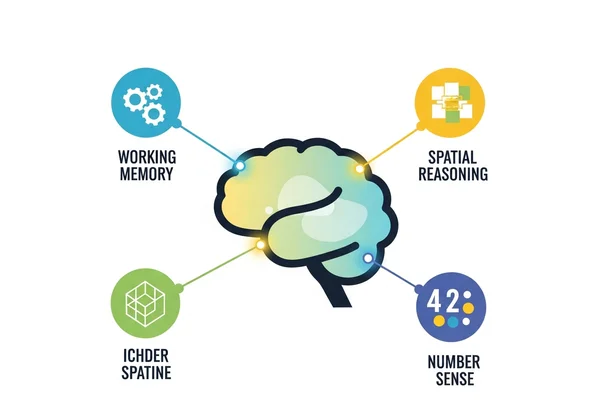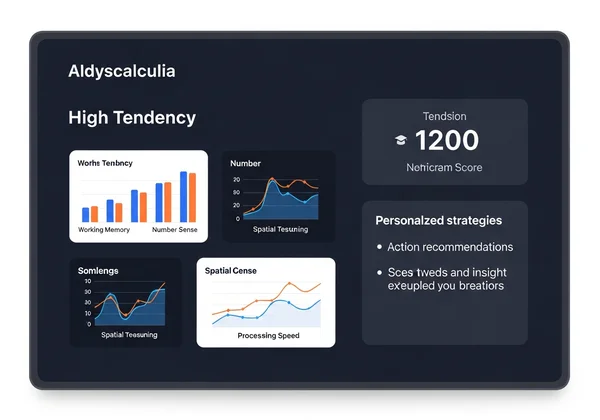Unlock Your Math Mind: AI Dyscalculia Test Report Analysis
November 13, 2025 | By Aisha Bennett
Have you recently taken a dyscalculia test and are now wondering what the results truly mean? Or perhaps you are considering it and feel curious about the depth of insight you could gain. Many online screeners provide a simple score, leaving you with more questions than answers. Do I have dyscalculia or am I just bad at math? This is a common and valid question, and a simple score is often not enough to answer it.
This guide will walk you through the power of our unique, AI-driven dyscalculia analysis report. We'll show you how this advanced tool moves "beyond the score" to reveal a detailed map of your unique mathematical mind. We will demystify each section, from cognitive profiles to personalized strategies, empowering you with a clear understanding of your numerical strengths and challenges. Ready to see how technology can illuminate your path to mathematical confidence? You can get started with our free dyscalculia test today.

Understanding Your Dyscalculia Cognitive Profile
The first step in moving beyond a simple label is to understand your individual cognitive makeup. Our AI report is designed to provide exactly that—a nuanced picture of how you process numerical information. This isn't about judging your ability; it's about understanding your unique cognitive style.
What Is a Cognitive Profile for Mathematical Learning?
Think of a cognitive profile as a detailed blueprint of your mathematical brain. It outlines how different cognitive skills—like working memory, spatial reasoning, and number sense—work together when you face a math-related task. A traditional test might tell you that you struggle with fractions, but a cognitive profile can help explain why. It might reveal a strong logical reasoning ability hampered by a weaker working memory for numbers, for example. Our AI analyzes your responses to the dyscalculia screening to build this personalized map, offering insights that are specific to you.
Unpacking Your Strengths and Challenges in Math
A crucial aspect of our AI analysis is its balanced approach. It doesn’t just pinpoint areas of difficulty; it actively identifies your strengths and challenges. You might discover you have excellent problem-solving skills or a creative approach to visualization, even if you struggle with quick calculations. Understanding these strengths is incredibly empowering. It reframes the narrative from "I can't do math" to "I approach math differently." This knowledge allows you, your parents, or educators to leverage your natural talents to develop new strategies for overcoming the challenging areas.

Decoding Your AI Dyscalculia Assessment Report
Once you complete our free screening and opt to receive the AI analysis, you unlock a comprehensive document designed for clarity and action. Let's break down what you can expect to find inside your personalized AI dyscalculia assessment.
Interpreting Your Personalized Score and Tendency
Your journey begins with a foundational result—your tendency level (e.g., Low, Medium, High) for exhibiting traits associated with dyscalculia. This initial score provides a general indicator based on your answers to the screening questions. While helpful as a starting point, it's just the tip of the iceberg. It answers the basic question, "Is there a possibility of a learning difference?" but the real value lies in the detailed analysis that follows.
The Role of AI in Tailoring Your Insights
This is where our platform truly stands apart. The AI engine does more than just tally a score. It performs a sophisticated pattern analysis on your responses, cross-referencing them with data from educational psychology and cognitive science. By considering your anonymous background information—such as age and learning goals—the AI generates a set of cognitive insights that are uniquely tailored to your profile. It’s similar to how a GPS uses multiple data points to create the best route for you; our AI uses your inputs to map the most effective learning path for your brain.
Sample Report Walkthrough: Key Sections Explained
To make this tangible, imagine your report is divided into a few key sections:
-
Cognitive Analysis Dashboard: This section might use simple charts to visualize your profile, showing relative strengths in areas like Logical Reasoning versus Number Magnitude Comparison.
-
Impact on Daily Life: Here, the AI translates abstract cognitive traits into real-world scenarios. For example, it might explain how a challenge with sequencing could affect managing appointments or following a recipe.
-
Personalized Strategy Toolkit: This is the most actionable part of the report. It provides a curated list of specific, evidence-based strategies. You won't find generic advice here. Instead, you'll receive recommendations tailored to your profile, such as using specific apps for managing finances or employing visual techniques to understand fractions.

Beyond "Bad at Math": What Dyscalculia Test Results Mean For You
Receiving a report that indicates a tendency towards dyscalculia is not a final verdict; it's a new beginning. It's the moment you stop blaming yourself and start understanding your brain. The insights from the what dyscalculia test results mean section are designed to be a launchpad for growth.
Translating Insights into Daily Life Strategies
The true power of your AI report lies in its practical application. It bridges the gap between understanding a challenge and knowing what to do about it. If your report identifies a weakness in spatial reasoning, it might suggest using graph paper to align numbers in columns or leveraging virtual manipulatives to visualize geometric concepts. These actionable advice points transform your report from a document into a daily guide for navigating a number-filled world with greater ease.
Actionable Strategies for Learning and Growth
Whether you are an adult seeking to improve your professional skills, a parent looking for ways to support your child, or an educator aiming to differentiate your instruction, the report provides a roadmap. It offers educational support by recommending specific tools, technologies, and teaching methods that align with your unique cognitive profile. This moves the focus from rote memorization to building genuine understanding and confidence. Ready to see what your personal roadmap looks like? You can unlock your report after a quick and easy screening.

When to Seek Professional Support Beyond Our Screening
It is critically important to understand the role of our tool. The Dyscalculia Test is a powerful screening tool designed to identify potential signs of math learning differences. It provides invaluable insights and guidance. However, it is not a medical diagnosis. If your report indicates a high tendency for dyscalculia or if you have significant concerns, we strongly encourage you to consult with a qualified professional, such as an educational psychologist or a neuropsychologist. They can conduct a formal diagnostic assessment and provide a clinical diagnosis. Our report can be an excellent starting point for that conversation.
Your Next Step Towards Math Confidence
Your journey to understanding your mathematical mind starts with a single step. Our AI-powered report offers an unparalleled glimpse into your unique cognitive profile, providing the clarity, personalized strategies, and forward-looking path you've been searching for. Don't just get a score—get a blueprint for success. This detailed analysis empowers you to turn challenges into strengths and transforms anxiety into action.
Ready to unlock your personalized insights and build a more confident relationship with numbers? Take our free dyscalculia screening today and discover the story your numbers have been waiting to tell.
Frequently Asked Questions About Your AI Dyscalculia Report
How does the AI dyscalculia assessment differ from a basic screening test?
A basic screening test typically provides a single score or category based on a simple questionnaire. Our AI dyscalculia assessment goes much deeper. It analyzes the patterns in your answers and contextualizes them with your anonymous background data to create a multi-faceted cognitive profile, complete with personalized strengths, challenges, and actionable strategies.
Can this AI report officially diagnose me with dyscalculia?
No, and this is a crucial distinction. Our AI report is a highly advanced educational screening tool, not a diagnostic instrument. A formal diagnosis of dyscalculia can only be made by a qualified healthcare or educational professional. Our report is designed to be a powerful first step to provide you with deep insights and to share with a professional if you seek a formal diagnosis.
What specific personalized strategies will my report provide?
Your report will provide a range of personalized strategies tailored to your cognitive profile. This could include recommendations for specific assistive technology apps, visual learning techniques, methods for managing math anxiety, and practical tips for daily tasks like budgeting or time management. The goal is to give you tools you can use immediately.
How can I use my AI dyscalculia report to help myself or my child?
For adults, the report can validate long-held struggles and provide a clear path for professional and personal development. For parents, it offers concrete strategies to support your child’s learning at home and can be a valuable tool for discussions with teachers. The report provides a common language and an evidence-based plan that empowers everyone involved. Get started with our online tool to help yourself or your child today.